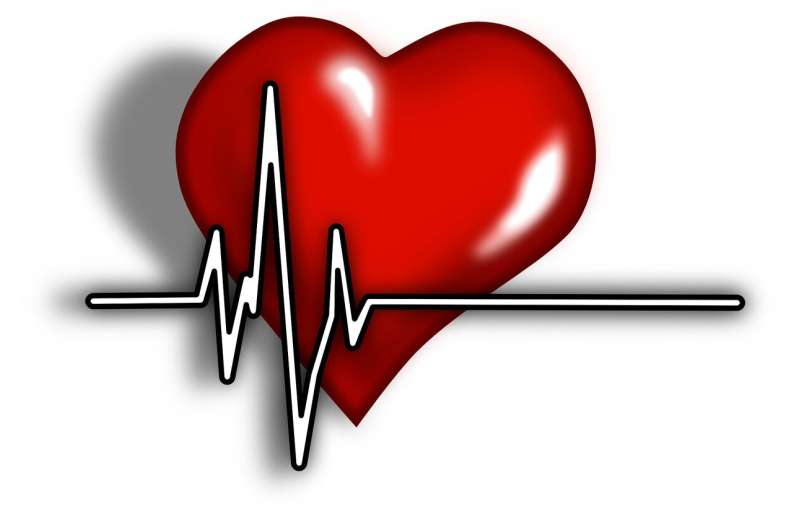This article has been reviewed according to Science X's editorial process and policies. Editors have highlighted the following attributes while ensuring the content's credibility:
fact-checked
trusted source
proofread
Heart attack patients should take aspirin to avoid a new heart attack, stroke and death, research finds

Heart attack patients who do not take daily aspirin have an elevated likelihood of recurrent myocardial infarction, stroke or death compared with those who consistently take the drug, according to research presented at ESC Congress 2023.
"Our findings suggest that not taking aspirin as prescribed after a heart attack is linked to a higher risk of having another heart attack, a stroke or dying," said study author Dr. Anna Meta Kristensen of Bispebjerg and Frederiksberg Hospital, Frederiksberg, Denmark. "We recommend that all patients who have had a heart attack stay adherent to their aspirin in accordance with guidelines until randomized controlled trials have proven otherwise, and clinical guidelines have been changed."
Aspirin is mandatory following a heart attack due its ability to prevent blood clot formation, and thus reduce the risk of a new heart attack or stroke. However, as treatment and diagnostic methods have advanced in recent decades, the prognosis after myocardial infarction has improved and the long-term effects of aspirin are now less evident. Because aspirin prevents the formation of blood clots, it also increases the risk of bleeding, and the balance between the cardiovascular benefits and bleeding changes with time after a heart attack. This study investigated the risk associated with discontinuation of long-term aspirin compared with continued use after a heart attack in a contemporary setting.
The study used data from Danish nationwide health registries. It included patients aged 40 years and over who had had a first-time heart attack between 2004 and 2017, were treated with a coronary stent, and took aspirin as prescribed during the first year after their heart attack. Patients who were on anticoagulants or had a stroke or recurrent heart attack within that first year were excluded.
Adherence to aspirin was evaluated at two, four, six and eight years after the heart attack. In Denmark, every time a patient picks up a prescription of aspirin, the number of tablets and date of collection are recorded in registries. Adherence to aspirin at each of the four time points was assessed as the proportion of days patients had their pills over the preceding two years. Patients on aspirin for 80% or less of the time were considered non-adherent (i.e., not taking aspirin as prescribed) while those on aspirin more than 80% of the time were considered adherent (i.e., taking aspirin as prescribed). At each time point, patients were excluded if they had experienced another heart attack, a stroke, died, or had been started on anticoagulants or P2Y12 inhibitors.
Dr. Kristensen explained, "We assessed the effects of long-term aspirin use in patients who were not receiving other medications for the prevention of heart attack or stroke. Both anticoagulants and P2Y inhibitors are agents that—similar to aspirin—work to prevent the formation of blood clots. Therefore, patients undergoing such treatments were excluded from our study."
The study included 40,114 patients with a first-time heart attack. Adherence to aspirin progressively declined with each time point, from 90% at two years following the heart attack to 84% at four years, 82% at six years and 81% at eight years.
The researchers analyzed whether patients who did not take aspirin as prescribed had a higher risk of the composite outcome of recurrent heart attack, stroke or death compared with those who consistently took aspirin. A number of factors that might affect the results were taken into account including age, sex, diabetes, high blood pressure, high cholesterol, kidney disease, cancer, stomach ulcers, previous bleeding events and chronic obstructive pulmonary disease.
At each time point, patients who took aspirin as prescribed were less likely to experience the composite outcome compared with non-adherent patients. Compared with adherent patients, non-adherent patients had a 29%, 40%, 31% and 20% higher likelihood of recurrent heart attack, stroke or death at two, four, six and eight years following the heart attack, respectively.
Dr. Kristensen said, "Our results should be interpreted with caution because they show an association but do not establish causality. Since the study is registry-based, we do not have information about the specific reasons as to why patients did not take their aspirin. Furthermore, our findings cannot be generalized to all patients who experience a heart attack, as our study specifically focused on those who received treatment with a coronary stent and were not taking other medications to prevent blood clot formation. With that in mind, the results support current guidelines recommending long-term aspirin after a heart attack."
More information: The abstract "Long-term aspirin adherence and risk of cardiovascular events and death after myocardial infarction: A nationwide cohort study" will be presented during the session Secondary prevention which takes place on Monday 28 August from 10:15 to 11:00 CEST at Station 10.


















